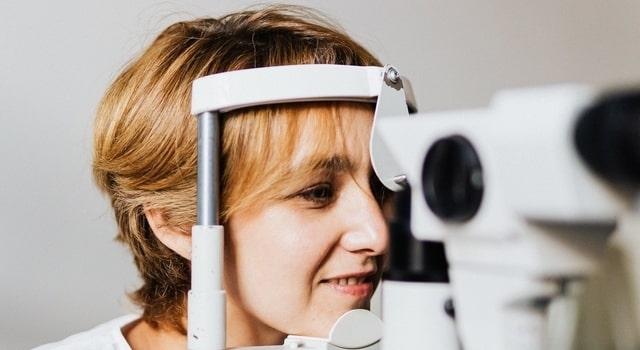
Having diabetes can impact more than just your blood sugar levels — it can also affect your eyes. One of the most significant risks for individuals with diabetes is developing diabetic retinopathy. This condition can lead to vision problems and even blindness if left unmanaged.
Understanding the symptoms and risk factors of diabetic retinopathy is paramount for individuals with diabetes, as they can take proactive measures to mitigate its progression and protect overall eye health.
What is Diabetic Retinopathy?
Diabetic retinopathy, a leading cause of blindness in adults, occurs when elevated blood sugar levels result in retinal damage. The condition manifests as abnormalities in the blood vessels of the retina, the light-sensitive tissue lining the back of the eye. This damage can eventually lead to vision impairment and, in severe cases, irreversible blindness if left untreated.
Understanding the Stages of Diabetic Retinopathy
Diabetic retinopathy progresses through two primary stages: non-proliferative and proliferative retinopathy. During the non-proliferative stage, individuals may experience minimal or no symptoms, making regular comprehensive eye exams essential for early detection. However, as the condition advances to the proliferative stage, vision changes and diabetic macular edema can occur, significantly impacting overall eye health and visual acuity.
Unraveling the Causes of Diabetic Retinopathy
Elevated blood sugar levels associated with diabetes play a pivotal role in the development of diabetic retinopathy. The impact of these elevated levels can lead to damage in the small blood vessels within the retina, causing them to leak fluid or bleed. This disruption, in turn, triggers the body's response to generate new blood vessels. This process can exacerbate the condition if left unchecked.
Do you have diabetes and are worried that it might affect your eye health? Schedule an eye exam today for peace of mind.
Identifying Risk Factors for Diabetic Retinopathy
It is crucial for individuals living with diabetes to understand the risk factors associated with diabetic retinopathy. Various factors can significantly increase the susceptibility to this eye complication, highlighting the need for proactive measures and comprehensive health management. These risk factors include:
- African-American, Hispanic, or Native American descent
- Poorly controlled blood sugar levels
- High blood pressure
- High cholesterol
- Smoking
- Pregnancy
Managing Diabetic Retinopathy: Diagnosis
The first step in effectively managing diabetic retinopathy is to have an accurate diagnosis. The gold standard for diagnosing this condition is a comprehensive dilated eye exam. Your eye doctor will use special eye drops to enlarge your pupils, allowing him to get a detailed view of your eyes. This exam may cause temporary blurriness in your close-up vision, but it is an essential diagnostic tool. During the exam, your eye care specialist will examine the inner and outer aspects of your eyes to detect any abnormalities.
In addition to a dilated eye exam, your eye doctor might recommend specialized diagnostic tests, such as fluorescein angiography. In this test, your eye doctor injects a dye into a vein in your arm and takes images as the dye travels through the blood vessels in your eyes. These images reveal any closed, broken, or leaking blood vessels.
Optical coherence tomography (OCT) is another diagnostic tool that provides cross-sectional retina images, enabling your healthcare team to gauge retinal thickness and evaluate the presence of any fluid accumulation. Regular OCT exams can also help monitor the effectiveness of your treatment.
Treatment: A Targeted Approach to Halt Progression
The treatment options for diabetic retinopathy largely depend on the type and severity of the condition. The primary goal of treatment is to slow or halt its progression. In cases of mild or moderate non-proliferative diabetic retinopathy, immediate treatment may not be necessary. Still, close monitoring is essential to determine the right time for intervention.
Working with your eye doctor to optimize diabetes management is crucial, as well-controlled blood sugar levels can significantly slow the progression in such cases.
For advanced diabetic retinopathy, prompt treatment becomes imperative. If you have proliferative diabetic retinopathy or macular edema, your doctor may recommend specific treatment approaches.
One option involves injecting medications into the eye, also called vascular endothelial growth factor inhibitors. These injections are administered into the eye's vitreous and help impede the growth of new blood vessels while reducing fluid accumulation.
These injections may cause minor discomfort and side effects, such as increased eye pressure or infection, and require repeated administration, depending on the severity of your condition.
Focal laser treatment, also known as photocoagulation, is another intervention. This laser treatment targets the leaking of blood and fluid within the eye, focusing on treating leaks from abnormal blood vessels with laser burns. Typically performed in a single session at your doctor's office or eye clinic, focal laser treatment can help prevent the worsening of macular edema, even though it might not fully restore normal vision.
The Role of Regular Eye Exams in Diabetic Retinopathy Management
Regular comprehensive dilated eye exams serve as a cornerstone in the early detection and effective management of diabetic retinopathy. These evaluations allow for the timely identification of retinal changes, enabling healthcare providers to implement tailored treatment strategies and preserve long-term vision health.
Contact Us for Diabetic Retinopathy Management
At Benavente Eyecare, we specialize in providing comprehensive care for individuals living with diabetic retinopathy. Our experienced team offers personalized treatment options and dedicated support to ensure optimal eye health and an enhanced quality of life. Contact us today at (219) 836-7800 to schedule your eye exam and learn more about effective management strategies for diabetic retinopathy.
